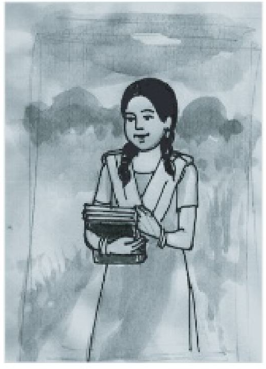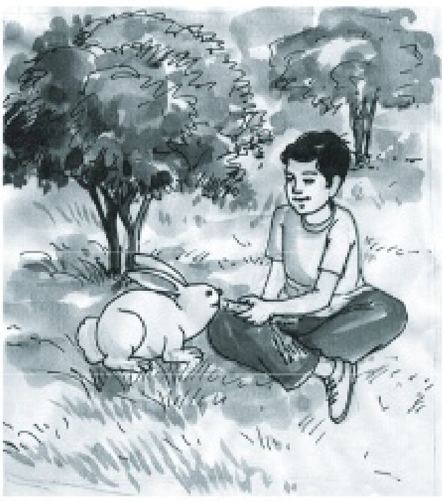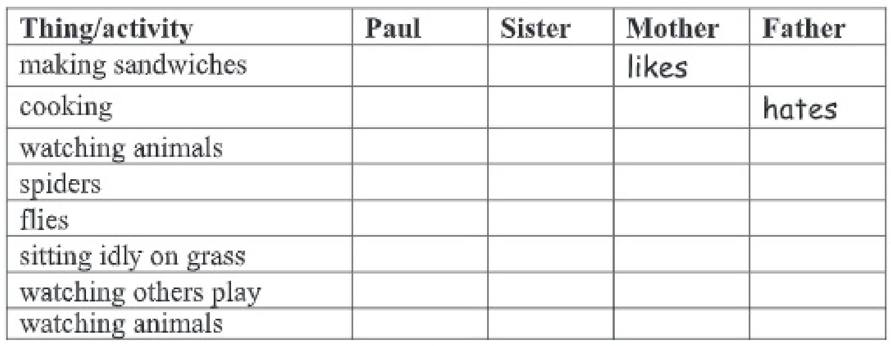
After we have studied this unit, we will be able to
Key words: chess photography fish cutlet classical music folk song pop music
adore (v) bloom (v)
A Play this game in pairs. Take turns asking and answering questions. Ask and answer as many questions as you can in five minutes to find similarities between your and your partner's likes. For each similar liking your pair will get one point. Add up your points when the game is over. The pair having the highest points is the winner. Use the following clue to play the game:
A: I like ice cream. And you?
B: I like ice cream too. (One point)
B: I like playing chess. And you?
A: I don't like playing chess. (No points)
B Read the dialogue between A and B silently. Underline the words that express liking/disliking. Then act out the dialogue in pairs.
A: Hello. How are you doing?
B: I'm OK. I've just finished a course on photography.
A: Great! Did you like the course?
B: Yes, I loved the course so much! You know, I like photography a lot. How about you? What sorts of things do you like?
A: I don't like photography but I like fishing. I went fishing to a nearby village last week. Did you ever go fishing?
B: Errr. I like eating fish. I actually love fish cutlet. But I don't like to go fishing. It's hard to wait for hours looking at the water!
A: That's right. You need to have patience. I enjoy fishing. It's really exciting when you catch a fish after hours of waiting. Would you like to come with me next time?
B: I'm not sure. But I would love to taste fish cutlet.
A: Well. I'll certainly invite you to come to my place and enjoy fish cutlets with me.
B: Thank you. Sounds great! Thanks!
C Now read about Kobita, a class 7 student of Sundarpur village. What does she say about her likes/dislikes?
Hello, I am Kobita. I am a class 7 student of Sundarpur High School. I like listening to music in my free time. I like folk songs but I don't understand classical music that much. However, my father likes classical music very much, but he doesn't like pop music. He never watches pop musical programmes on TV. He says he hates them because they don't appeal to emotions. My favourite singer is Farida Parvın. I like her songs very much. She has a wonderful voice. I also like gardening. I have planted many flowers in my garden. When the flowers are in full bloom, I love to watch them. I'm very happy about the flowers that I grow. I just adore them!

D Ask and answer the questions in pairs.
1 Why doesn't Kobita like classical music?
2 What does Kobita's father think about pop music?
3 Who is Kobita's favourite singer? Why does she like her so much?
4 What does Kobita think about her garden?
5 What does the sentence "I just adore them!" mean?
E Now make five sentences about what you adore, love, like, don't like and hate.
F Study the table below. In pairs use the table to ask and answer questions to talk about your and your friend's likes/dislikes.
I | like | juice.
working in the kitchen, |
I | do not/ don't like | |
You | like | |
You | do not/ don't like | |
He/She/Raju | likes does not doesn't like | |
They/Girls | like do not/ don't like |
Key words: vocational theatre stage (v) children's classics
perform (v) borrow (v) frequent
load shedding delicious bitter gourd
A Make questions from the table. Then ask and answer them in pairs.
Find how many of you like/dislike each of these five things.
| Do you like | watching cricket on TV? reading ghost stories? eating pineapples? doing mathematics? getting up early? |
B Read about Kobita's village. Then discuss in pairs what you like/dislike about her village.
The name of Kobita's village is Sundarpur. It is a small village on the bank of the river Kalini. The beautiful river flows through the village. There are one high school, three primary schools and one vocational training centre in this village. Kobita and her friends take computer lassons at this centre. There is a theatre club and a small library too. Kobita can borrow books from the library. She borrows books on history, poetry and children's classics. The theatre club stages plays regularly. Last month Kobita enjoyed the Mohua drama dance performed by the theatre club. The village has a bazar on the river side. This is a very noisy and dirty place. Kobita never goes to the bazar. The village roads are also narrow and dirty. Although there is electricity in Sundarpur, the villagers experience frequent load shedding in summer.
C Look at the food that Kobita usually eats at home. In pairs match the names of the food items given below with the pictures.

D Now, discuss which of the foods above you like or dislike. Follow the example below:
A: Do you like French fries?
B. Yes, I do. They're delicious.
A: Do you like dried fish?
B: No, I don't. I can't stand the smell.
Key words: volunteer arsenic poisoning green coconut
A In pairs, tell your partner the names of four things- one thing you like, one thing you dislike, one thing you love and one thing you hate. But don't tell him/her which ones you like, dislike, love and hate. Your partner guesses which one you like/dislike/love/hate. Follow the example given below.
A: Mathematics, washing clothes, rain, dry fish
B: You like mathematics.
A. You're right.
B: You love washing clothes.
A. That's not right.
B: Then you love rain and hate washing clothes.
A: Yes.
B: And you dislike dry fish
A: Right. My turn now!
B Paul is a young volunteer of an international NGO in Bangladesh. He visits Sundarpur to talk to the villagers about arsenic poisoning. Read the passage to know about his visit.
Paul went to Sundarpur High School to meet the teachers and students there. He was warmly greeted by all. He quite enjoyed the green coconut drink that was served on his arrival. He gave a short lecture to the students and explained how they would fight against arsenic poisoning. Paul also answered the questions asked by some students. He liked most of the questions. He also took some pictures with the students. He always took his camera with him. He loves photography.
As he was taking leave, all the students followed him up to the school gate. The teachers wanted to hire a rickshaw for him. He does not like riding rickshaws. He is used to walking short distances on foot, and likes getting some exercise. So, he did not mind walking towards the local Union Council Office.
C In pairs, discuss the following questions.
1 Why did Paul go to Sundarpur High School?
2 Did Paul like the students and teachers of the school?
3 How was Paul entertained at the school on his arrival?
4 What did Paul talk about to the students of the school?
5 Why doesn't Paul like riding rickshaws?
D Read the statements about Paul's likes/dislikes and replace the underlined parts of each sentence with phrases given in the box.
1 Paul quite likes the green coconut drink.
2 He didn't mind walking along the village roads.
3 He loves taking pictures.
4 He hates sitting idly in a rickshaw.
| really dislikes | did not dislike | very much enjoys | really likes |
E Write your likes and dislikes in the grid below. Then compare your completed grid with a partner.

Key words: sip (v) baggy trousers reluctant magazine dish dessert chopped skip (v) taste
A In pairs, partner A thinks of something s/he really likes/dislikes and tells partner B about this through miming. partner B tries to guess what partner A wants to tell. Take turns as partner B mimes and partner A tries to guess.
For example, partner A may do the miming of picking a cup from the saucer, sipping tea from the cup and then making an expression of disliking to show that he really dislikes having the tea.
B Read the following text about Paul's visit to Kobita's house and answer the following questions.
Paul went to meet Kobita and her family the next day. He was in his blue trousers and a grey T-shirt. Kobita's mother, Ms Shahana was a shy woman and she was reluctant to come in front of Paul. But Paul greeted her warmly in his newly learnt Bangla, "Kemon achen?". Ms Shahana loved hearing a foreigner speak in Bangla. She welcomed Paul to her house. Kobita started talking to Paul. She wanted him to write something for her school magazine. As they were talking, Ms Shahana prepared quite a number of Bangladeshi dishes. She served him lunch at noon. Paul had plain rice, chicken curry, fish bhuna, dal and salad for lunch. He liked the tastes of all those delicious items except the dried fish bhorta. He is afraid of hot chillies. He also does not like eating fresh onions. So he skipped the mashed potato which had chopped fresh onions in it. But Paul became very fond of the dessert made of rice, gur, milk and coconut. He also enjoyed drinking tea made of fresh cow milk. Paul thanked Kobita and Ms Shahana for the lunch. In fact, he was tired of having vegetables and fried eggs for the last few weeks. He hates eating the same food for weeks. So he enjoyed the tastes of a variety of Bangladeshi dishes
Questions
C Read the expressions of liking and disliking taken from the passage in B. First, complete the sentences. Then, arrange the sentences in order of 'liking very much' to 'disliking very much'.
D Now write a true sentence about yourself with each expression and compare your sentences with a partner.
Key words: shuffle (v) feed (v) rabbits sandwiches spider
fly insects bush relax run
A Write five sentences on one piece of paper describing what you really like, don't really like etc., but don't write your name. Your teacher will collect the pieces of paper from all students. He/she will shuffle and give them back to you all. When you have received the piece of paper written by some other student, read it and guess who could be the writer.
B Now, read the article that Paul has written for the school magazine of Sundarpur High School about his childhood memories.
Hello, dear readers. I'm Paul. The boy that you can see feeding a rabbit in this picture was me when I was a little kid. Today, I'm going to tell you how I spent my childhood days, and what my family and I liked and disliked.

My family and I loved going to the park on weekends. We liked having picnics there. My sister and I liked to watch the animals. My mother made simple sandwiches for us because both my mother and father hated cooking on picnic days. My sister and I loved playing around the park and feeding the animals. I didn't like sitting on the grass and doing nothing for hours. My parents liked to watch us play while they talked. We all liked going to the park because we loved being outdoors and feeling free. We could relax there and listen to the birds singing. We also enjoyed watching the little rabbits running around.
We could play as much as we wanted, but my father got angry if we went near the bushes. He didn't like letting his children go too far out of sight. Sometimes, when we went too far away, my mother called us back. She used to tell my sister that she had seen some spiders near the bushes. My sister was afraid of spiders. She still hates them. I'm not afraid of spiders, but I don't like flies. I just can't stand those little insects.
C Fill in the table below against each thing/activity. Use the words likes/doesn't like/loves/hates appropriately under each member of Paul's family. Two are done for you.

D Now write sentences using the table about people in Paul's family and your family. The first two are done for you.
E Use the clues to write questions and answers about likes/dislikes.
F Look at the grid below. It shows the likes and dislikes of four people. First tick the boxes to show your liking. Now write sentences about what you and the people in the grid like and don't like. One is done for you.

common.read_more